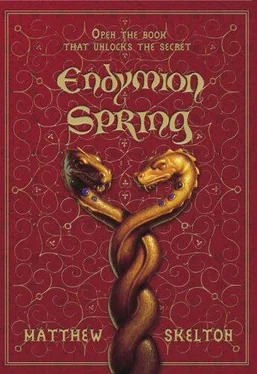For weeks, I kept to the grassy banks of the river. Fust had placed a bounty on my head and I was no better that a wanted criminal. I avoided the inns, which were infested with lice, fleas and thieves, and bedded down with the cows in the fields at night. Nowhere was safe. No one could be trusted.
The book was my sole companion, but even this did not contain any news of Herr Gutenberg or Peter. For all its power, it could not bring them back to me. I was befriended only by the past, by the memories of those I had left behind.
As I neared Coster's homeland, the birthplace of the book, the place where Coster had slain the dragon, I began to fear that Fust had finally caught up with me. His name was never very far from the lips of the people I passed in the woods or villages; but it was a name spoken of with loathing and distrust. His theft had not been forgotten. It rankled in the hearts of Coster's countrymen. Yet, even here, the book was not safe. Haarlem was too close to Mainz and Fust could follow my tracks too easily. Only in the depths of the vast new library William had described in the Little Lamb could its pages be properly be hidden. I kept going.
In Rotterdam, where the Rhine meets the sea, I found a vessel bound for England and two or three days later emerged from it, dazed and disorientated, in a city far larger than any I had known: London. Hungry and cold, I shivered through the densely packed streets, shunning strangers and disappearing into anonymous cracks. I could not wait to be free of the city. Yet there seemed to be no end to the wharves, houses and alleys that flanked the busy river, spewing their filth into the mighty waterway that cut through that land like a gash. Boroughs festered outside the city walls.
Nevertheless, as the drunkard William had promised, the river eventually narrowed into a more navigable stream and I followed its wriggling course through the more pleasant countryside, overtaken by boats loaded with luxury silks and linens. Half-starved, I stole from farms and hamlets, sheltered beneath the lych-gates of old stone churches and watched miserably each night as the day's reflections sank in the turbid water.
Finally, Oxford lay, huddled in mist, on the other side of the river. The spires were not nearly so grand as I had imagined — they squatted closer to earth than aspired to heaven — but I was cheered by the thought of the colleges and libraries, and the expectation of somewhere warm to rest my weary feet, which were rubbed raw with blisters.
I rushed forwards, joining a pilgrimage of laborers up to the South Gate, but my cheerfulness turned almost to despair.
"Your kind is not welcome here," snarled the shorter and smellier of the guards at the gate. I could barely comprehend his language. His face, however, said it all. His partner stared fixedly over my head at the restless line of people behind me.
My bright yellow cloak was no more than a soiled rag and my skin was covered with sores and abrasions. I looked like a victim of the plague.
I began to unfold my notebook, hoping to prove that I could read and write — surely a valuable skill in a university town — but they were not impressed.
"Look, be off with you," said the more officious guard. "If you don’t move on, I'll throw you in the boggards' prison myself."
He shoved me roughly back and I tripped over the edge of a cartwheel that had been drawn up close behind. I collapsed in a pool of muck and thought I heard a mule snigger. Tears of humiliation pricked my eyes.
I got up and brushed the dirt from my already tattered clothes. I had faced too many obstacles to be turned away so easily. While the guards inspected the other travelers, checking their loads and wagons, I concealed myself in a cartload of squawking chickens and sneaked into town. Theodoric, however, must have noticed my notebook and kept a safe distance behind, biding his time…until my fever overcame me, my world went black and I collapsed in the filthy street.
◬
I awoke to find Theodoric examining the little notebook by my side, wondering why the clasps would not open even for him. He noticed me eyeing him from the edge of sleep and welcomed me back to the world of the living with an immense grin.
We were in a long infirmary lined with straw-filled beds. I was the sole occupant.
Sheets of radiant light streamed in from the vine-trellised windows, offering glimpses of the garden outside. Chests and cabinets stood with their backs to the walls.
The afternoon hummed with heat. Flies circled the air in drowsy loops and bees droned near their hives. Bunches of dried flowers had been tied to the rafters to obliterate the smells of death and disease, the rooms previous tenants.
Theodoric looked around him apprehensively. I could tell that a question was burning his lips, but he seemed uncertain how — or if — to ask. Despite my aching bones, I sat up, grimacing with the effort.
"You can read?" he said at last, when he judged me ready to answer.
I nodded.
"And write?" he asked, even more doubtful. He glanced at the window, through which we could see black-robed monks tending the garden, hopping from plant to plant like crows. Theodoric had phrased both questions in Latin, which it pleased him to know I understood.
Again I nodded.
"But this," he said, pointing to the book and stroking the letters on the cover. "This is a different kind of book. You are blessed with a secret knowledge, yes?"
Wearily, I smiled. I was too tired to explain. Besides, who would believe my story?
Theodoric did not appear to mind my silence. "You must rest," he said finally, and then got up as a solitary bell clanged outside, summoning him to prayers.
◬
The bed they had placed me in was as soft as a cloud. I could have lain there forever. It had freshly laundered sheets, sprinkled with lavender and tansy to keep the fleas at bay, and the straw mattress smelled every bit as sweet as the day it was threshed. I did not care that this could be my deathbed. After the ditches and fields I had slept in, it felt like heaven.
For days, I drifted in and out of consciousness. Each time I surfaced, I found Theodoric doting over me like a faithful puppy. He treated the chlblains on my feet with a poultice made from marjoram and prepared bittersweet remedies for me to drink. At first, the feverfew and lemon balm made my skin erupt in prickles of sweat, but gradually I began to recover my appetite and regain my strength. Soon I was able to sit up and take note of my surroundings.
My clothes lay in a paltry heap on the floor at the foot of the bed — a dingy skin I had sloughed off like a past life. The bright yellow cloak, which Christina had so lovingly sewed for me, was now no more than a flimsy burial shroud. In its place I wore a garment of white cloth, its sleeves far too wide for my skinny arms. They spread out from my shoulders like wings.
To amuse me, Theodoric tried on the long yellow hood I had worn on my arrival. It sat on his head like a dirty sock, a tiny jester's cap, making me laugh. Whereas the other monks shuffled past as discreetly as possible, keeping a respectful distance, through vows of silence were not strictly observed, Theodoric seemed unable to remain quiet or still for long. He was too full of questions.
Where had I come from? Why had I chosen Oxford? What was so special about the books I carried.
I tried my best to satisfy his curiosity with a system of nods and smiles, but said nothing. He trusted that I would speak when the time was right.
The books strapped to my back had caused no end of speculation when the monks first undressed me. Theodoric told me there were rumors, perpetuated by Ignatius, that I carried the Devil on my shoulders: the sealed volume was surely a sign of my wicked heart. But if my strange cargo troubled Theodoric he gave no indication of it. Instead, he tried to assure me that both books were safe in a chest close to my bed. He had one key, and I the other. He would let no one near them.
Читать дальше










